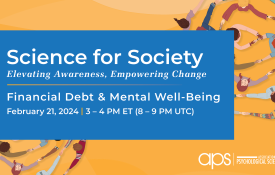-
People Have Very Different Understandings of Even the Simplest Words
In 2017Kris De Meyer, a neuroscientist who directs the Climate Action Unit at University College London, ran the opening session of a conference on decision-making under uncertainty for an audience of scientists, finance professionals and policy makers. He divided them into groups of six and gave them questions and activities centered on their personal and professional experiences of risk. After a while, some hands went up. “They said, ‘We just realized we cannot agree on the definitions of risk and uncertainty,’” De Meyer says.
-

New Content From Perspectives on Psychological Science
A sample of research on intergroup attitudes, social drivers on digital media, the conversational silencing of racism in psychological science, what makes a group emotional, and much more.
-

Spending, Saving, and Owing: How Finances Intersect with Behavior and Emotions
In a February Science for Society webinar, a panel of experts discussed the impact of financial debt on psychological well-being, the link between spending habits and happiness, and much more.
-
For Gen Z, an Age-Old Question: Who Pays for Dates?
During a recent dinner at a cozy bar in Upper Manhattan, I was confronted with an age-old question about gender norms. Over bowls of ramen and sips of gin cocktails, my date and I got into a debate: Who should pay for dates? My date, a 27-year-old woman I matched with on Hinge, said gender equality didn’t mean men and women should pay the same when they went out. Women, she said, earn less than men in the workplace, spend more time getting ready for outings and pay more for reproductive care. When the date ended, we split the bill. But our discussion was emblematic of a tension in modern dating.
-
A Leading Memory Researcher Explains How to Make Precious Moments Last
Our memories form the bedrock of who we are. Those recollections, in turn, are built on one very simple assumption: This happened. But things are not quite so simple. “We update our memories through the act of remembering,” says Charan Ranganath, a professor of psychology and neuroscience at the University of California, Davis, and the author of the illuminating new book “Why We Remember.” “So it creates all these weird biases and infiltrates our decision making. It affects our sense of who we are.” Rather than being photo-accurate repositories of past experience, Ranganath argues, our memories function more like active interpreters, working to help us navigate the present and future.
-
As Prices Increase During a Recession, Mental Health Usually Decreases
In periods of economic recession, negative mental health symptoms like depression, anxiety, panic attacks, and self-harm tend to increase, according to a study in Behavioral Sciences. Adverse changes in the labor market create wage cuts and layoffs. And for those who remain employed, decreased workplace safety standards and increased workloads are catalysts for poor mental health outcomes like worthlessness, anxiety, shame, and frustration. “High inflation typically causes anger and frustration, especially toward elected officials,” says Jim Butkiewicz, macroeconomist and economics professor at the University of Delaware.

